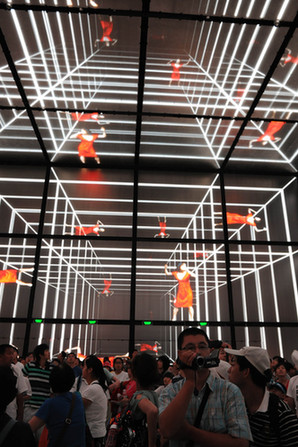SHANGHAI - The Expo 2010 Shanghai is lighting up the new green potential of LED technology.

Visitors are captivated by the State Grid Pavilion's Magic Box, which uses 112 LED panels to create a visual illusion for visitors. Song Weixing / for China Daily |
More than one billion LED chips are producing about 80 percent of the indoor illumination for the pavilions, Expo officials said.
"The Expo Garden has become the largest demonstration of the latest LED lighting technology in China," said Zhu Weihua, deputy chief of the electronic information industry division with the Shanghai Municipal Commission of Economy and Informatization.
"We hope the Expo can help promote the wider use of LED technology, especially in city landscape lighting and roadway lighting," he said.
LED technology is considered the future because of its environmental friendliness and high efficiency.
Though compact florescent bulbs also save energy compared to traditional incandescent bulbs, they contain the toxic chemical mercury, said Wang Lizhong, general manager of Shanghai Sansi Electronic Engineering Co Ltd, one of China's largest LED display system producers.
"If the compact florescent bulbs are not recycled properly, they can lead to heavy environmental pollution," he said.
LED bulbs, however, will not pollute the environment, and consume 30 to 50 percent less power than traditional energy-saving bulbs, he said.
The technology has been included in the country's medium- and long-term strategic plan for technological development, according to Zhu.
Shanghai has taken the lead in developing LED technology in the country by establishing a comparatively complete industrial chain, he said.
But to succeed in promoting the wide use of LED bulbs, producers still have to solve the cost issue.
The price of a compact florescent bulb is 20 yuan ($2.40), whereas an LED bulb may cost 100 yuan, industry insiders said.
The higher cost comes from the LED chip, mostly imported from overseas, industry insiders said.
"We are searching for substitute materials to cut the cost," he said. "If we can lower the price to 50 yuan ($6), then it will be affordable."

